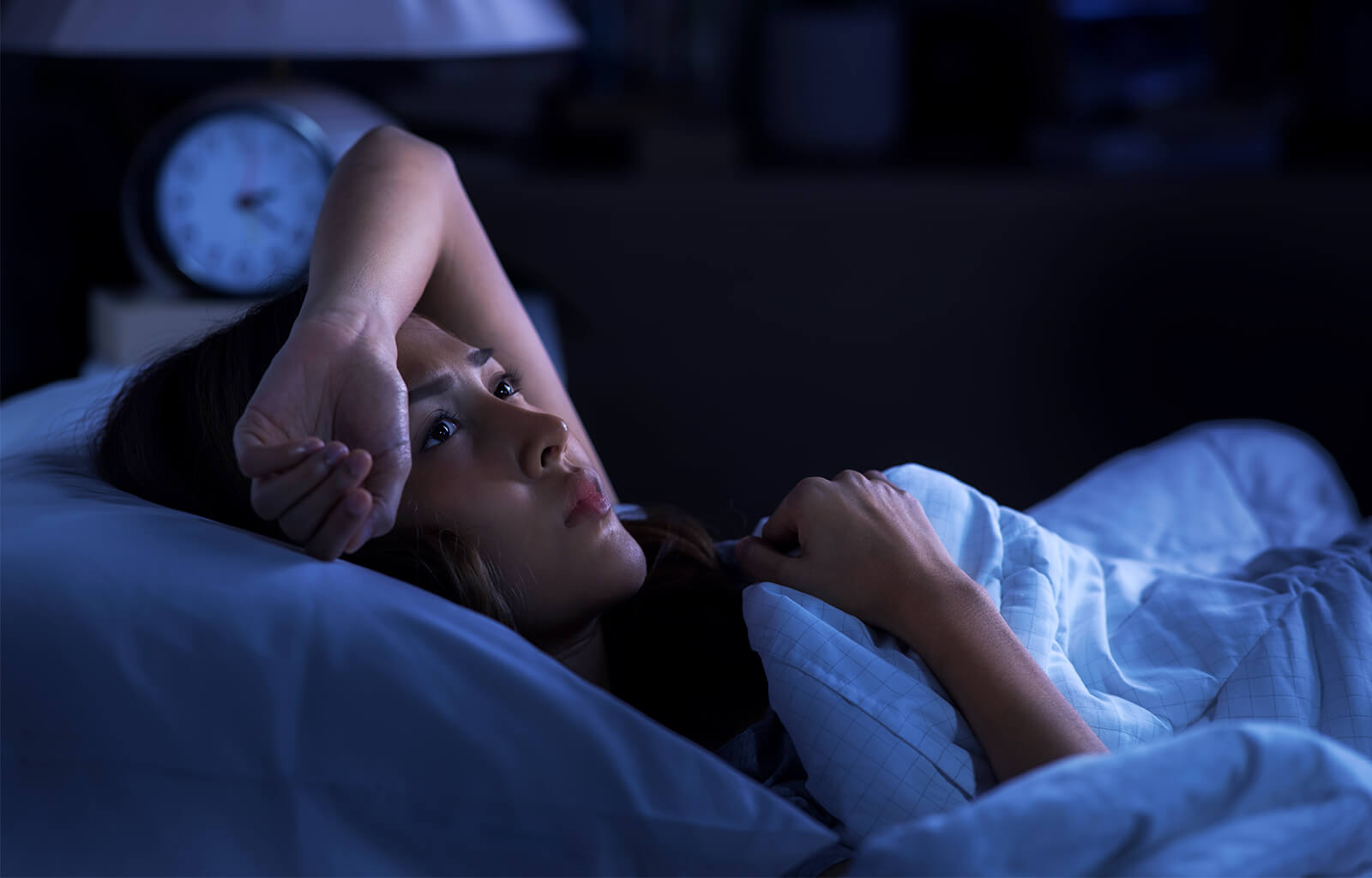
The most common sleep disorders – causes and first aid
Table of Contents
- Sleep disorders
- Causes of sleep disorders
- The most common sleep disorders
- Difficulty falling asleep
- Difficulty sleeping through the night
- Sleep-disordered breathing
- Disorders of the sleep-wake rhythm
1. Sleep disorders
We spend around a third of our lives sleeping - at least when we get the average and recommended sleep duration of 7 - 8 hours. However, especially in hectic everyday life or stressful working life, our sleep is often neglected and one in five people in Germany already suffers from sleep disorders. A DAK study also shows that working people are particularly affected and 80% of employees already suffer from sleep disorders and problems falling asleep and staying asleep. Women tend to be affected more often than men.
We all sleep poorly at some point and are tired, irritable and not very productive the next day. Having difficulty falling asleep in the long term, repeatedly waking up from sleep or lying awake for hours not only damages our daily form, performance and psyche, but can also have serious health consequences such as an increased risk of cardiovascular diseases and depression. What we can do to improve sleep depends primarily on the type, severity and cause of our sleep problems.
2. Causes of sleep disorders
Sleep medicine distinguishes between more than 80 different sleep disorders. We generally speak of a sleep disorder when we as those affected do not find our sleep restful. In particular, problems falling asleep, difficulty staying asleep or disorders of the sleep-wake rhythm are widespread and influence the natural sleep process to such an extent that the quality of sleep is reduced and the night's sleep becomes less restful.
There can be a variety of causes for each type and severity of sleep disorders. Factors such as environmental influences (e.g. b Light, noise, sleeping environment) or your own sleeping behavior (bedtime, sleep hygiene). However, serious illnesses as well as organic or psychological circumstances can also have a negative impact on sleep and thus place additional strain on us.
Important: Chronic sleep disorders can harm your health and significantly reduce your quality of life, so you should not take a lack of sleep lightly!
3. The most common sleep disorders
Chronic insomnia includes, among other things, problems falling asleep and staying asleep and is the most common type of sleep disorder. Many people are also affected by breathing difficulties during sleep or disorders of the sleep-wake rhythm and sometimes even unconsciously suffer from the numerous consequences of these sleep disorders.
#1 Trouble falling asleep

Our internal clock is responsible for ensuring that our body calms down in the evening. As darkness increases, the release of the sleep hormone melatonin increases, which makes us tired and sleepy - we fall asleep. Numerous external and internal influences can influence hormone levels and make it difficult to fall asleep. If it regularly takes longer than 30 minutes to fall asleep after going to bed, health experts speak of problems falling asleep.
Common causes: An irregular sleep-wake rhythm, acute and chronic stress, the wrong diet or external stimuli such as bright light, noise and sleeping environment can affect the hormonal balance or disrupt the relaxation that is important for sleep .
First aid: Observe general sleep hygiene, maintain a regular sleep-wake cycle, avoid heavy meals and foods containing caffeine and high sugar.
#2 Trouble sleeping through the night

Difficulties sleeping through the night are primarily reflected in the fact that those affected repeatedly wake up at night and find it difficult to fall asleep again. Our sleep usually follows fixed sleep cycles that include both light and deep sleep phases. Involuntary awakening from a deeper sleep phase is particularly damaging to sleep quality, because the body and mind regenerate in deep sleep. Awareness of sleep problems can also lead to stress and excitement at night for those affected, which makes it even more difficult to fall asleep again. You can find out more about the causes of waking up at night here.
Common causes: External stimuli such as light, noise, temperature and sleeping environment, frequent urge to urinate, poor diet, physical complaints and stress can lead to sleep being disrupted and falling back asleep becoming a challenge.
First aid: Observe general sleep hygiene and avoid potential disruptive factors before falling asleep. For example, reduce your fluid intake in the evening, promote relaxation and stay calm and relaxed even when you are awake at night.
#3 Sleep-related breathing disorders

Irregularities and breathing disorders are also common. These include, for example, snoring, but also the occurrence of pauses in breathing, so-called sleep apnea. Snoring is usually manifested by the typical loud breathing noises, which, however, are due to narrowed airways and can therefore directly affect your own sleep, but also that of our partners. Sleep apnea, on the other hand, describes the brief cessation of breathing for pauses of up to ten seconds. These pauses in breathing activate the brain and therefore repeatedly interrupt sleep.
Common causes: The airways narrow, for example. b Allergies or colds, as well as unfavorable sleeping positions and malformations of the mouth and throat can narrow the airways.
First aid: Obesity, alcohol and nicotine consumption as well as an unsuitable sleeping position can cause breathing problems during sleep. We have described simple tips against snoring here.
#4 Disturbances of the sleep-wake rhythm

Disruptions to the so-called circadian rhythm occur particularly frequently as intermittent sleep disorders. It is not for nothing that people are said to be “creatures of habit”, because our internal clock controls sleep-wake behavior in such a way that we become tired as darkness increases, sleep at night and wake up again in the morning at daybreak. If this rhythm is out of balance, it is usually difficult to sleep restfully or even to fall asleep at all.
Common causes: Shift work and traveling through different time zones in particular mean that we have to be active or sleep at unusual times.
First aid: Avoid frequent changes between sleeping and waking times, as these throw the body and mind out of balance and prevent the development of healthy sleeping habits. Also interesting: Sleep restfully despite shift work.
Nowadays there are already numerous nutritional supplements and medications that are intended to help you fall asleep and ensure a good night's sleep. However, many common and especially chemical sleeping pills can suppress natural sleep and quickly become addictive. If you need help falling asleep, you should definitely pay attention to natural active ingredients and a natural mode of action. Depending on the cause and severity of your sleep disorder, even small measures such as changing your sleeping behavior or proper sleep hygiene can sustainably improve your sleep and ensure that you can start the day full of energy in the morning. Sleep well!
4. Conclusion
-
Sleep disorders are widespread and already affect 80% of working people in Germany.
-
Sleep disorders can have numerous negative effects on physical and mental health and arise from a wide variety of external and internal causes.
-
The most common sleep disorders are problems falling asleep and staying asleep, sleep-related breathing disorders such as snoring or sleep apnea and disorders of the sleep-wake rhythm.
Greetings and see you soon!




Leave a comment
This site is protected by hCaptcha and the hCaptcha Privacy Policy and Terms of Service apply.